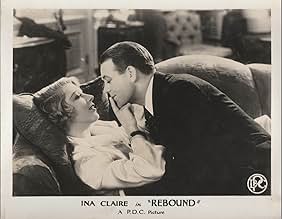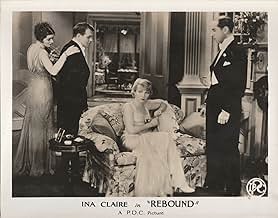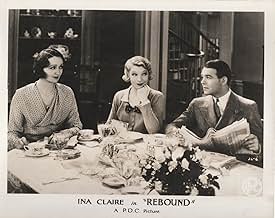अपनी भाषा में प्लॉट जोड़ेंStory of a girl's unhappiness after her marriage to a man just jilted, and the manner in which she finally wins his affection.Story of a girl's unhappiness after her marriage to a man just jilted, and the manner in which she finally wins his affection.Story of a girl's unhappiness after her marriage to a man just jilted, and the manner in which she finally wins his affection.
Moon Carroll
- Undetermined Role
- (बिना क्रेडिट के)
George Davis
- French Porter
- (बिना क्रेडिट के)
Raymond Largay
- French Lawyer
- (बिना क्रेडिट के)
फ़ीचर्ड समीक्षाएं
Ina Claire is spunky and likable as a woman whose husband is drawn to an old flame, Robert Williams is smooth and witty as her friend, and Myrna Loy is suitably vampy as the 'other woman', but the script for 'Rebound' is mediocre and it drags on over its 89 minute run time. I watched it for Loy originally, but Claire is the real reason to. It's also interesting to see Williams in the same year he starred in 'Platinum Blonde' before passing away. I won't spoil the ending except to say I thought it was awful, though perhaps fitting with what seems like a pretty staged and canned plot.
The movie itself is stagy and stuffy. But Ina Claire is brilliant. Her performance defines a manner of acting that dominated comedies through the 1960s.
It is easiest, perhaps, to see Connate Bennett as someone in her mold. Irene Dunne was too, and it's interesting to note that Claire made a silent version of "The Awful Truth."
Others who seem to have either imitated or been directed to emulate her include Margaret Sullavan, Alice Brady, Eve Arden, and even Arlene Francis (the only salvation of the dreadful "One, Two, Three.")
Myrna Loy is saucy as the other woman but Claire dominates the proceedings.
It is easiest, perhaps, to see Connate Bennett as someone in her mold. Irene Dunne was too, and it's interesting to note that Claire made a silent version of "The Awful Truth."
Others who seem to have either imitated or been directed to emulate her include Margaret Sullavan, Alice Brady, Eve Arden, and even Arlene Francis (the only salvation of the dreadful "One, Two, Three.")
Myrna Loy is saucy as the other woman but Claire dominates the proceedings.
Ina Claire had big eyes, an upturned nose, a precision of inflection to rival Judy Holliday's, and a way of dominating a room the moment she entered it. Not conventionally pretty, and too old for this sort of of dewy-young-thing part (she was about 40), she's nevertheless a joy to watch. The movie, from a mildly successful Donald Ogden Stewart play, is one of those drawing-room comedies that pretends the Depression never happened and spends most of its time arranging and rearranging couples. It's fluff, and with, shall we say, a last-minute happy ending one doesn't believe. But Claire is so watchable, with more intelligence than a woman could profitably employ in those days, and Myrna Loy is a delectable rival. There's also Robert Williams, a fine light comedian (check out Capra's "Platinum Blonde") who died tragically young. Good time capsule, and one of the few 1931 movies you can show your contemporary friends without blushing.
... since this is practically a one person movie derived from a play, and I could tell it was derived from a play just by watching it because it seems to neatly divide into acts and seems somewhat stagebound. By this time motion was not a problem for talking pictures, so technology is no excuse.
Ina Claire plays Sara, the unmarried daughter of a mother who just won't treat her like an adult because she is not married. Sara loves Bill Truesdale (Richard Ames), who in turn loves Evie Lawrence (Myrna Loy) who is being wooed by the wealthy older Lyman Patterson. Oh, and to make this confusing diagram complete, Johnnie Cole loves Sara, who likes him but does not return his affection.
What makes all of these dominoes finally fall one way or the other is Evie eloping with Lyman, a relationship that nobody even knew about. What's worse, Evie was supposed to show up for lunch with Sara and Bill, and her elopement is what causes her not to show up. Bill is heartbroken and he and Sara marry on the rebound.
Bill acts happy with Sara, but then he runs into Lyman and Evie on the street, and suddenly Bill and Evie are spending all of their time together. If Sara tries to bring up the subject to Bill he just says she is being silly. It's clear he is not going to ask for a divorce, nor is Evie, but they are freezing out their spouses from their respective relationships. Meanwhile John is still hanging around, looking for scraps of affection from Sara. Sara has learned to be careful what you ask for because you just might get it.
How does this all work out? Watch and find out. Anything could happen since this is the precode era. This kept my interest in spite of the familiar one-sided romance ground that it trod. Like I said, this is practically a one person film since nobody has significant lines other than Ina Claire. One interesting point it brings up. Early in the film, before all of the hasty marriages, Sara is mentioning how her father is always sending her letters that end with "Never change". She understands what that means after her father explains it to her and after all of the hasty marriages begin to crumble.
I'd watch it for Ina Claire's performance, even if the dialog and the pacing are a bit stilted.
Ina Claire plays Sara, the unmarried daughter of a mother who just won't treat her like an adult because she is not married. Sara loves Bill Truesdale (Richard Ames), who in turn loves Evie Lawrence (Myrna Loy) who is being wooed by the wealthy older Lyman Patterson. Oh, and to make this confusing diagram complete, Johnnie Cole loves Sara, who likes him but does not return his affection.
What makes all of these dominoes finally fall one way or the other is Evie eloping with Lyman, a relationship that nobody even knew about. What's worse, Evie was supposed to show up for lunch with Sara and Bill, and her elopement is what causes her not to show up. Bill is heartbroken and he and Sara marry on the rebound.
Bill acts happy with Sara, but then he runs into Lyman and Evie on the street, and suddenly Bill and Evie are spending all of their time together. If Sara tries to bring up the subject to Bill he just says she is being silly. It's clear he is not going to ask for a divorce, nor is Evie, but they are freezing out their spouses from their respective relationships. Meanwhile John is still hanging around, looking for scraps of affection from Sara. Sara has learned to be careful what you ask for because you just might get it.
How does this all work out? Watch and find out. Anything could happen since this is the precode era. This kept my interest in spite of the familiar one-sided romance ground that it trod. Like I said, this is practically a one person film since nobody has significant lines other than Ina Claire. One interesting point it brings up. Early in the film, before all of the hasty marriages, Sara is mentioning how her father is always sending her letters that end with "Never change". She understands what that means after her father explains it to her and after all of the hasty marriages begin to crumble.
I'd watch it for Ina Claire's performance, even if the dialog and the pacing are a bit stilted.
For the 1930s this is quite a revealing movie about how men use women and vice verse. It's as if this love quadrangle could have been filmed yesterday if it had starred current Hollywood actors/actresses who have already lived through such situations in their actual love lives.
Escaping depression era problems, many moviegoers went to the theater to forget the reality of their lives. The opulence of the sets and glamorous gowns might have provided the female viewers of the time with an opportunity to fancy the lives of the rich.
It's a classy, clean romp that might be considered for a re-make with a lot more skin showing.
The acting may be wooden in a few scenes, but altogether is made for a delightful viewing.
I thoroughly enjoyed it.
Escaping depression era problems, many moviegoers went to the theater to forget the reality of their lives. The opulence of the sets and glamorous gowns might have provided the female viewers of the time with an opportunity to fancy the lives of the rich.
It's a classy, clean romp that might be considered for a re-make with a lot more skin showing.
The acting may be wooden in a few scenes, but altogether is made for a delightful viewing.
I thoroughly enjoyed it.
क्या आपको पता है
- ट्रिवियाThe preview time of 75 minutes was reported by the Motion Picture Herald in its issue of 13 June 1931, so that it is possible that footage was added before the general release. In any case, RKO lost $215,000 on the film.
- साउंडट्रैकSame Thing Over Again
(1931) (uncredited)
Music and Lyrics by Roy Ringwald and Lindsay McHarrie
Played during the opening credits and often as background music
Played on piano and sung by Myrna Loy
टॉप पसंद
रेटिंग देने के लिए साइन-इन करें और वैयक्तिकृत सुझावों के लिए वॉचलिस्ट करें
विवरण
- चलने की अवधि1 घंटा 29 मिनट
- रंग
- पक्ष अनुपात
- 1.20 : 1
इस पेज में योगदान दें
किसी बदलाव का सुझाव दें या अनुपलब्ध कॉन्टेंट जोड़ें



























